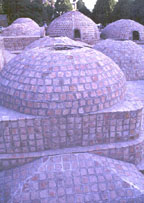The cradle of civilisation, the breadbasket of the Soviet Union, even the location where Noah's Ark was supposed to have ground to a halt. These are some of the phrases used to describe the Caucasus region. In reality, this is one of Europe's most fragile but strategic melting points.
Nine friendly miles
There are 1800 miles of international borders in the Caucasus, only the nine miles of Azerbaijan and Turkey are friendly. Abkazia, Ossetia and Nargorno-Karabakh are not destinations in the latest Harry Potter novel.
Long before relief agencies, journalists and politicians coined the phrase "ethnic cleansing" for the Balkans, Caucasian militia gangs where kicking out their neighbours as far back as 1988. Looking at a map, if you can find an up-to-date one, is a mish-mash of autonomous, semi-autonomous, no-go areas and unwritten borders, with basically three countries: Georgia, Armenia and Azerbaijan. With Chechnya, Dagestan, Russia, Iran and Eastern Turkey as neighbours, it's nice company to keep.
Ten years after independence from the Soviet Union, things are disappointing for the Caucasus, with a another horrendous war in Chechnya and Islamic rumblings in Ossetia and Dagestan. Throughout the south, towering, rusting factories and farming complexes lie rotting.
Drastic economic decline has left once-prosperous families to eke out a living, and USD 16 per month government pensions are often unpaid to the elderly. There's no health service and little help for the disabled or abandoned children.
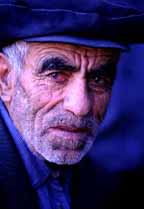 |
| Old man in Georgia |
All three republics have had their share of war and loss, creating hundreds of thousands of displaced people and refugees. Roads are pot-holed and narrow, railways slow and squalid, police road blocks are frequent and customs officials are notorious for taking bribes. The easiest flight connections are via Moscow or Istanbul. While their Baltic cousins happily returned to Europe, the Caucasus missed the boat.
My journey started on the sands and frigid, polluted waters of the Black Sea. Georgia is an ancient and fascinating place, with varied and dramatic landscapes and the blue grey Caucasus Mountains running along the north. It is the land of Jason and the Golden Fleece, the birthplace of Stalin and home to ancient blood feuds and the "Tamada," a relentless, structured series of toasts with highly potent homemade mulberry Vodka. It is impossible to avoid, with the warm Georgian hospitality, and embarrassing if you can't keep up.
Once the favourite holiday resort of affluent Russians, the coast is littered with the shells of faded holiday complexes, like a Butlins holiday camp after the bomb.
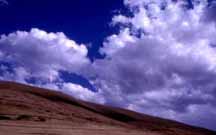 |
| Georgian landscape |
As a moral boost and reward to their loyal workers, Soviet factories would transport their workers for two weeks in the sun. I guess this is the Western equivalent of paintball "team spirit building" weekends for overweight, overpaid executives. Yuri, aged 65, a pot-bellied Yeltsen-look-alike stands in the afternoon sun, reading. "I have been coming here for 25 years, it was a beautiful place to come with your family and we had many good memories here."
Memories are pretty much all people have nowadays. Not long ago, most people lived fairly well-off middle class lives—where 70% were educated up to university level with free health care, state pensions and jobs for life. This all disappeared almost over night in 1990. When aid agencies first came to the region on assessment missions, they asked people what they needed most. The answer: "jobs, to be able to support ourselves again."
The road back to Tbilisi, the capital, is a gauntlet of deep potholes and small herds of cows that refuse to budge for the speeding traffic. The gruelling six-hour drive is also hampered by the regular police speed stops, manned by bored underpaid traffic cops who wave a stick, blow a whistle and demand a fine to pay for their lunch.
Medicine, newspapers, children...
Tbilisi was described to me by a friend as a "sleazy Paris in the 1920s." Tree-lined avenues are bustling with pretty, made-up women and men in dapper suits and shiny shoes. While others sit for 14-hour-days at ramshackle kiosks selling prescription glasses and medicine, more sell newspapers, sweets and Coca-Cola. The architecture is a strange mix, with ancient castles and spa baths next to Middle Eastern style back streets and alleys. 18th century European libraries and cultural buildings stand next to the bland, concrete Soviet-era state buildings, and the housing estates in the suburbs make Mosside look like Chelsea.
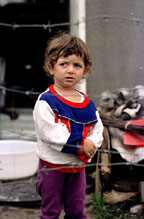 |
| Chechen child in refugee camp |
"You should see them burying dead children in cardboard boxes!" states an orderly at the children's home. State-run orphanages are a breeding ground for disease and misery. The dormitories are freezing cold and infested with insects, while the children survive on bread and water. The state allocates each child USD 1.50 a day, but only USD 0.20 of this money actually reaches the orphans. The rest is stolen or embezzled.
It is estimated that less than half of Georgia's 16,000 homeless children live in similar institutions, the rest simply roam the streets. Some of the children turn to drugs and glue in escapism. Others resort to prostitution in Tbilisi's red-light area; the older prostitutes are facing serious competition from 12 to 16 year-olds of both sexes.
Tbilisi's local government claims there are just 400 street children in the capital and see it as an embarrassing inconvenience rather than a human tragedy. Several NGOs have started to help set up privately run schools. Foreigners have been banned from adopting Georgian orphans since 1997, when the government outlawed the practice of "selling our children abroad."
Georgia is fairly safe nowadays, although—as with the rest of the southern states—kidnapping is a popular form of income. Encouraged by the success of Chechens and Russians working together and the millions to be made, eighteen cases were recorded in eight months. A week before I arrived, a Red Cross jeep had been found abandoned and a busload of German tourists were fired upon.
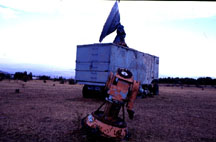 |
| Ex-Soviet listening station in Georgia |
One morning at an army roadblock, a young girl, sick with fever, cried helplessly about not being able to reach the hospital. Two Russian peacekeeper jeeps sped passed and a white UN helicopter flew overhead, while our driver harangued the troops for an a reason why we were not able to pass. Then the BOOM-BOOM!! from shells echoed across the valley. Oh, that's why.
Surviving on shaky grounds
Armenia has had a history of hard times from all sides, from decapitating Turks in the 1920s to land grabbing Iranians in the south. Yet it was nature that tipped the balance in the last half of the century. In 1988, a devastating earthquake destroyed 40% of Armenia's productive industry. Soviet states, such as Ukraine, rushed in to rebuild and help, but, before they were anywhere near finished, the USSR collapsed and they upped and left.
Most people lost their savings in 1990 when the banks collapsed. They did gain independence in 1991, but the breakdown of the centralised system ensured a widespread drop in living standards, an increase in poverty and general mayhem. A six-year war with Azerbaijan broke out in Nargorno-Karabach, to which Turkey responded with a trade blockade. Now shops are filled with cheap goods from Tehran instead of cheap goods from Istanbul. With a population of 3.7 million, western analysts estimate over two million of the best brains, talent and earning power have left and settled elsewhere, mainly in the USA.
As we drove through the epicentre, a huge, newly built Orthodox Church stood tall and grand over the crumbling homes and dusty streets. "A gift from American-Armenians," our driver motioned with his eyes. Thanks, but what about building materials, a health centre, a new school? Amen to that.
Crossing a set of mountains that resemble a setting for a Ford car advert, the road to the capital Yerevan is better than the previous bum-numbing rides. Yet there still stands the same abandonment of huge industries, cars and trucks stopped in the tracks. With sky-high fuel prices, it's back to horses and cart, as floppy-hatted old men bounce past carrying twigs, wheat, corn or family members.
 |
| Yerevan town centre |
Yerevan is a twisting city on many different levels, with layers of buildings upon buildings, cobbled streets, complicated road systems and the compulsory multi-storied tower blocks. Smart shops with Italian clothing and jewellery adorn the main drags, while small cobblers, markets and vodka shops fringe the alleys. A central square with a fountain is the main focus point for any evening, with cafes and bars sprawling alongside. Young groups of male and female teenagers eye each other in their best clothes. Trendy kids with long hair pull stunts on roller blades and blush in front of onlookers when they spin out.
I headed for the tiny border village of Khachik, looking out over disputed Nakhichevan, the land-locked Azeri enclave nestled between Turkey and surrounded by Armenia. For Azeris to travel to this region they have to cross by land through Iran or fly from Azerbaijan's capital to Turkey and doubleback again by land.
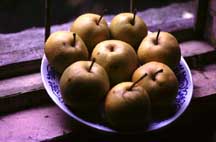 |
| Fruit by a window (Armenia) |
The Tadevosian family lives right in firing range of the frontline. They recounted the numerous times they sheltered in their basement, living in fear and unsure if their village would be overrun. In Soviet times they were a well-off middle-class family. The father, a veterinarian specialising in horses, would travel the region and was well-paid. He still holds a Government position, but his USD 40 per month salary has not been paid for nine months.
At the highest part of the village is a small garrison of gold-toothed teenage military lookouts. The spotty conscripts beamed for a photo but warned not to travel any further with stern faces and waving of fingers.
Governments are just as fragile in Armenia as they are in neighbouring countries. Last October, gunmen brandishing AK-47s, live on state TV, opened up and laid waste to the Prime Minister and several members of Parliament. They claimed it was triggered by government corruption, but it also stalled the peace talks.
President Robert Kocharian is continuing to spearhead an ambitious plan to boost security in the South Caucasus, envisioning a "stability pact" between the former Soviet republics and their political allies. Choosing suitable partners could prove problematic in a region where America, Europe, Iran, Turkey and Russia all have conflicts of interests. The Centre for European Policy Studies has devised a formula of its own. The Brussels think tank is proposing a "Caucasus G8" including the EU and America.
Across the unwritten border
Any pact idea is impractical while the Nagorno-Karabakh peace talks remain stalled. There is a cease-fire, though technically they are still at war. Some have suggested a land swap that would give a southern corridor of land back to Azerbaijan in return for safe passage to the Nakhichevan enclave nestled against Turkey. Armenia is cool to this, as it would close its one friendly border with Iran. Armenia has already started promoting Nagorno-Karabach as a tourist destination, and Armenians have slowly inhabited either side of the unwritten border with Azerbaijan. Baku has already lost the southern corridor as a bargaining chip anyway.
Recent discoveries suggest that the biblical Garden of Eden was less metaphoric than we presumed. The location is believed to be the Aji Chai valley in Azerbaijan. Archaeologists have researched geographical references from the book of Genesis and found the remains of a once-lush paradise garden surrounded by dry, desert mountains.
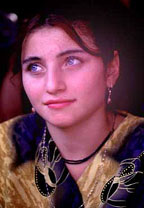 |
| Refugee girl from Nargono Karabah |
Greeks, Romans, Persians, Arabs, Georgians, Mongols, Turks, Central Asians and Russians have all had their influence on the people and land. Azerbaijan is still a pretty cosmopolitan place. The mysterious Caucasians having blonde hair and blue eyes have been diluted and altered by the numerous Empires, raiders, pillagers and overlords, although they still do crop up now and then. Some believe they were the children descending from Adam and Eve, while some believe they were the first Alien-human off spring!
In the early 1990s, in a manner reminiscent of the old gold rushes, the world's energy companies rushed to Baku, this time for black gold. It was about time. Azerbaijan had lost its status as Russia's main oil source to Siberia after the Second World War. Production had steadily dropped from 70 per cent in the 1940s to only two per cent in the 1970s.
Although the oil wells survived, they where poorly managed and an environmental disaster. The industry was saved in 1994 by a "deal of the century," with a USD 7.4 billion oil development pact. This followed predictions that the Caspian could dwarf Saudi's output. People braced themselves for a new oil boom. It's yet to happen. If it has, unlike in the Arab States, the general population hasn't noticed or felt the benefits. A Western source stated 100 British firms are pulling out each month.
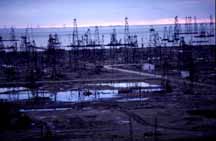 |
| Oil fields of Baku |
A controversial 1730-kilometer pipeline linking the Caspian Sea with Europe is still on the drawing board. The BP-Amoco move is a setback to Russia's rival proposal for a northern route to Novorossiysk. Tehran, who wanted the pipeline to go through Iran to the Gulf, is pretty much out of the picture. Interestingly, company officials have pointed to "a distinction between the strict commercial nature of oil exports and the geo-strategic aspect of the pipeline project". They claim it is needed to tie the countries of the Caucasus and Central Asia to the West, even if the cost is high. An oil worker based there for four years said that there was a new find in the Caspian, implying that, if it were drilled, it would also justify the million-barrels-per-day capability project.
With Shiite faith and cell phones
Baku town center is filled with stalls, cafes and historic monuments. Tucked away from spewing traffic, quiet old city streets are filled with playing children and cats. Mobile phone shops are more prevalent than Indian take-aways in Brick Lane London. The cell phone has turned into more than a modern day convenience, it is a status symbol.
Women with pouting lips and dark glasses walk with them glued to their ears whether on or not. Men don them on their belts in fancy leather cases like modern day swords. Men can spend up to half their meagre salaries maintaining their latest Motorolas and Ericsons, but it's wellworth while, as they even woo potential partners with this show of wealth. The Azeris are Muslim but of a very subtle Shiite faith.
Influenced by cheap Mexican and Latin soap operas dubbed into Russian, it's normal for girls to go clubbing in cropped tops and mini skirts that would make a Brazilian blush. The saying "the Koran told us not to drink wine so we drink vodka" pretty much sums things up.
The landscape varies from flatland deserts with old nodding oil donkeys, to sub tropical oases; the cool Caucasian Mountains give way to windswept Caspian shorelines and magical, eternally burning fiery caves. There is a new breed of youth, an elite that works hard and plays hard. They are breaking the traditions of staying with the family, having relationships other than with the childhood sweethearts their families intended them to marry and can check e-mail while eating a Big Mac at numerous Internet cafes.
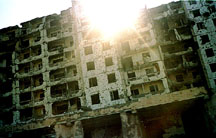 |
| Bombed (Chechnya) |
It may all seem far removed from Europe, but it has future implications with the ever-growing EU and NATO members. Western politicians reject the idea of membership as unrealistic at present, which it is; all three countries have huge obstacles to overcome before meeting any of the criteria.
But, once Turkey has met the requirements the corridor will lead straight to the Caucasus, presumably infuriating Iran and Russia, if they are still out of the picture.
Not all are in favour of running to Europe. Ashot Manucharian, National Security advisor to Armenia's former President, states "Russia is the most obvious partner for any such pact." He declared any "revolutionary formula involving the EU and America [is] unacceptable." A top Russian Military planner, General Leonaid Ivashov, recently said: "American involvement in the region was risking an explosion" and threatened "counter measures" if Georgia and Azerbaijan continued to consider ideas of a European link.

|
For only flirting with the notion of a Western alliance, Moscow recently announced its intention to slap travel visa requirements on all Georgians and Azeris creating chaos and a huge financial burden on workers and traders. Another current Kremlin scheme is to hand out Russian passports to any ex-Soviet citizen. For desperate citizens of Abkhazia, South Ossetia and Southern Georgia, for example, it will instantly create large numbers of Russian citizens and, one day, maybe a majority to lobby for a return to Russia.
For all their internal and regional strife, poverty, uncertainty and general malaise about life, Caucasian family values and loyalty, the people have managed to remain extravagantly hospitable. If the people are given half a chance, there is hope for a return to their vibrant and colourful past.
Alex Smailes, 15 January 2001
all photos by author
Moving on:
- Browse through the CER eBookstore for electronic books
- Buy English-language books on Central and Eastern Europe through CER
- Return to CER front page



